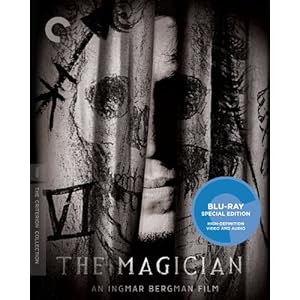

Ingmar Bergman neophytes should begin elsewhere, but lovers of the auteur's output will warm to The Magician (known in its native Sweden as "The Face"). This somewhat off-the-beaten-path entry from the filmmaker behind The Seventh Seal, Wild Strawberries, Scenes from a Marriage and Fanny and Alexander finds Bergman in a typically contemplative mood, but the musings about existence and death complement a surprisingly pointed self-portrait of the artist as a middle-aged man. Both a rebuke to critics and a confession of charlatanism, The Magician puts forward a one-of-a-kind examination of the problem of truth in life and in art.
The story concerns a travelling troupe described as having "an exceptionally troubled conscience": the great but tormented mesmerist-magician Dr. Albert Emanuel Vogler (Max von Sydow), the curious Mr. Aman (Ingrid Thulin), seen-it-all herbalist Granny Vogler (Naima Wifstrand), all-purpose huckster Tubal (Ake Fridell), and coach driver Simson (Lars Ekborg). Upon their arrival in Stockholm, the players are waylaid by Minister of Health Dr. Vergerus (Gunnar Bjornstrand), police superintendent Starbeck (Toivo Pawlo), and consul Abraham Egerman (Erland Josephson), authority figures intent on proving the magician an immoral fraud unfit to entertain the locals. Vogler presents himself as mute, but agrees to private performances to demonstrate his true abilities.
Of course, little is as it seems: Vogler can speak, and Mr. Aman turns out to be his wife Manda in disguise. The line between truth and lies proves slippery: Tubal sells the servants "love potions" that achieve results from the placebo effect, and Granny Vogler appears to have genuine supernatural knowledge. On the dark and stormy night that comprises most of the film, Manda concludes, "Nothing is true." Earlier, an alcoholic actor on the road to Stockholm agreed that truth is an illusion, while the book he carries claims, "Deception is so prevalent that those who speak the truth are usually branded the greatest liars."
The stand-in for mirthless critics, Dr. Vergerus puts his stock wholly in science and supposedly demonstrable fact, resenting the winningly virtuosic illusions of Dr. Vogler ("You mustn't offend the new faith," Granny observes). Ironically, Vergerus can not cut so deeply with his attacks as grieving Mrs. Egerman does with her implicit praise: Vogler becomes racked with guilt at her credulity in his power to reach the dead.
Bergman, of course, is the magician: a highly adept artist whose dance with big questions (the secrets of existence and mortality) entertains and potentially enlightens as it reflects responsibility back on the audience. Though filled with disturbing aphorisms about the lack of definitive answers to those big questions, The Magician resembles The Seventh Seal not only in its passages of earthy comedy but in its ultimate choice to embrace the positive. This life is all we have: better to be a triumphant magician than a thwarted scientist.

|
|
 |
Criterion delivers another exquisite presentation of a Bergman classic in The Magician. The beautiful transfer is easily the best this title has ever looked on home video, with a hi-def image that retains a film-like character while scrubbing away accumulated dirt and print damage. The result is a picture that looks as fresh as it must have in its initial release: spot-on contrast and deep blacks bless the black-and-white image, and detail is revelatory. Criterion keeps it simple (and faithful) in the sound department with a Swedish LPCM 1.0 track that's perfectly clear.
Among the extras are two Ingmar Bergman interviews touching on The Magician: a 1967 "Swedish Television Interview" (3:37, HD) and the 1990 "Assayas-Björkman Interview" (20:51, HD) conducted by French filmmaker Olivier Assayas and Swedish author and documentary filmmaker Stig Björkman.
"Peter Cowie" (14:54, HD) is a thoughtful video essay that finds the author and Bergman expert deconstructing The Magician in its themes and autobiographical elements.
As always, the disc is packaged with a handsome booklet illustrated with art from the film. The forty-page booklet includes credits, tech specs, and essays by Assayas ("A Portrait of the Artist," excerpted from Cahiers du Cinema), film programmer and journalist Geoff Andrew ("Through A Glass Drolly"), and Bergman himself ("Bergman on The Magician", excerpted from his 1994 book Images: My Life in Film). Bergman fans and serious cineastes should consider this purchase an imperative.
 |